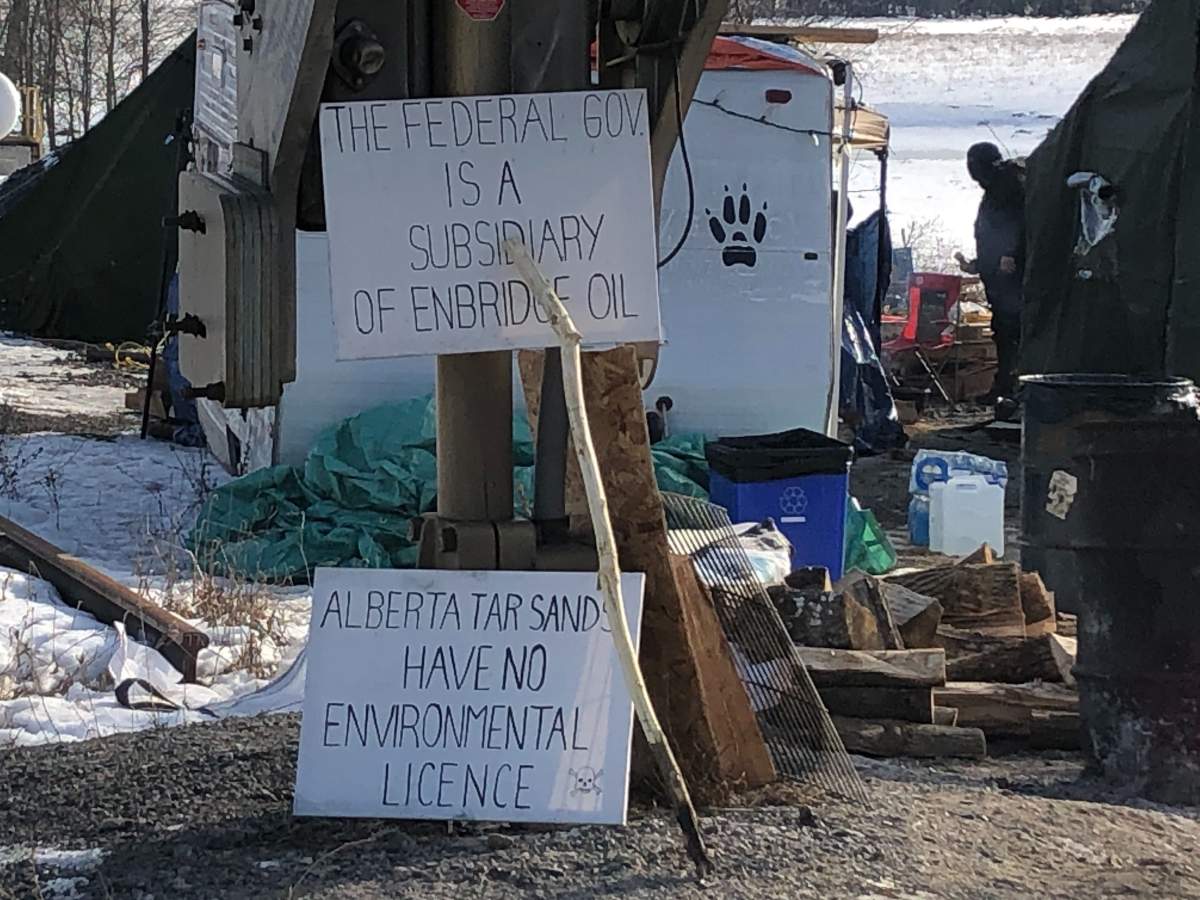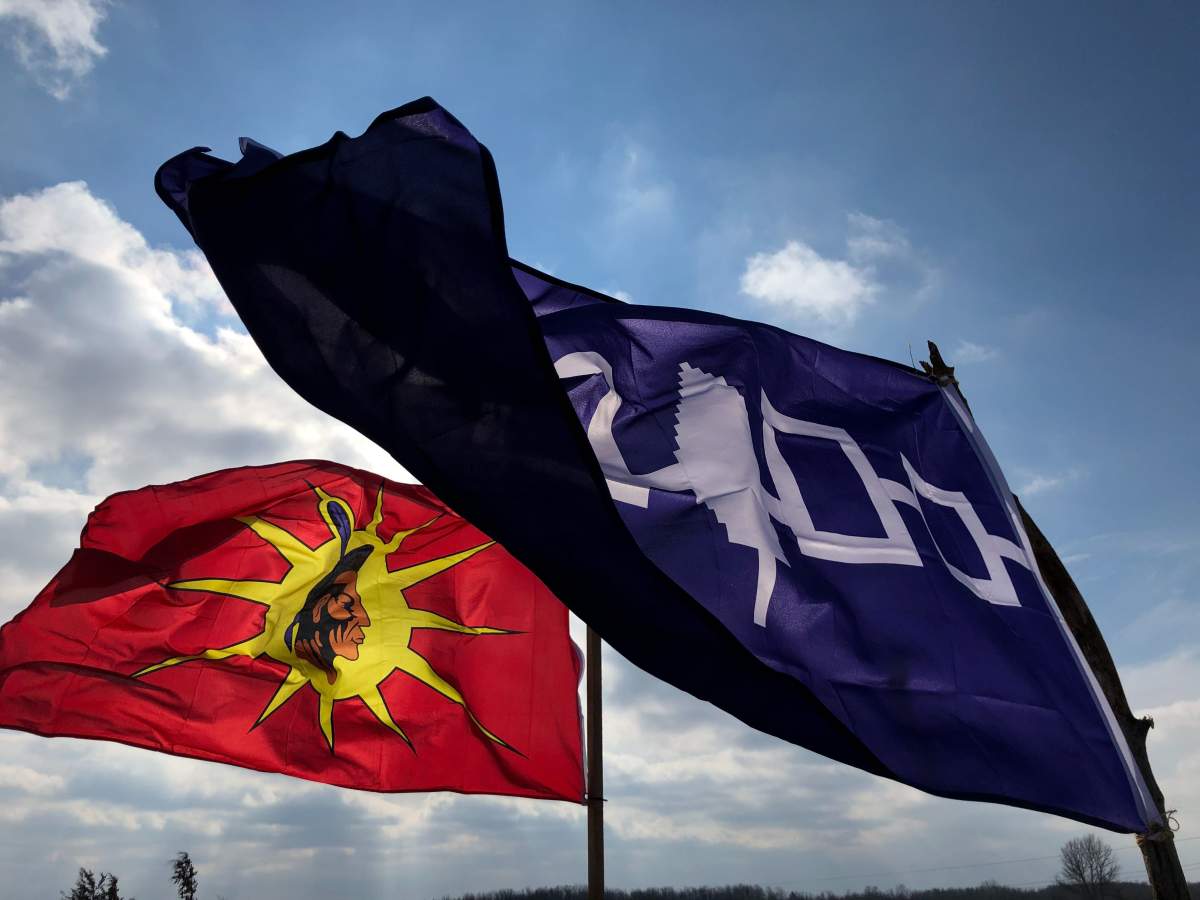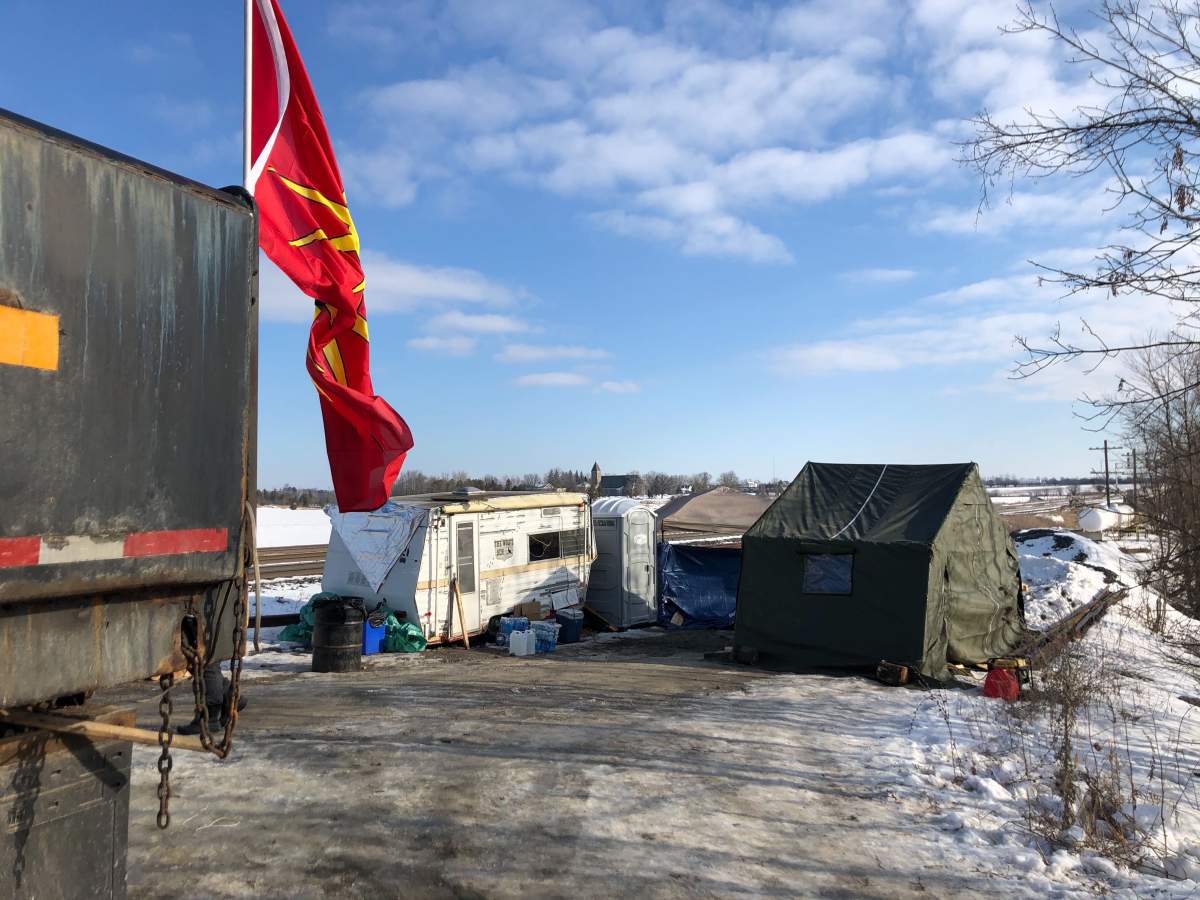A blockade set up at a rail crossing near Belleville, Ont., has once again stopped rail service on the Montreal-Toronto and Toronto-Ottawa routes, which are among the country’s busiest rail corridors, in both directions.

Wednesday marks the seventh day in a row that both passenger and commercial trains have been unable to travel those routes due to a group of protesters camped out at a rail crossing in Tyendinaga Township, just metres away from Tyendinaga Mohawk Territory.
A protester, who simply identified himself to Global News as George, said he had been out protesting at the level rail crossing in Tyendinaga since Thursday.
“I believe what we’re doing is right,” the 76-year-old said in an interview Wednesday. “I don’t care if I’m 89, I’ll be here if we have to stand up again.”
Jaylee Thompson, who says he is not an active protester but a Mohawk supporter, was at the rail line Wednesday morning. He said Indigenous communities have been forced into disrupting rail service through the blockade in order to be heard.
“So for us here in the community, that’s really the only option that we have. We don’t have a voice,” Thompson said.
The blockades have popped up around Canada in solidarity with Wet’suwet’en Nation hereditary chiefs, who are protesting the Coastal GasLink pipeline project in northern British Columbia.
RCMP received an injunction to enter a blockade on unceded Wet’suwet’en land last Thursday, and since then several arrests have been made.
As Brenda Gunn from the University of Manitoba recently explained, the Wet’suwet’en Nation has never officially surrendered its Aboriginal title – its right to the territory.

The blockade in Tyendinaga Township at a rail crossing at Wyman Road started intermittently on Thursday evening but has been in full force since Friday morning.
“When we talk and we speak and we try to make ourselves heard to corporate Canada, the Canadian government, however you want to put it, they just don’t listen,” Thompson continued.
Another smaller demonstration has set up down the road from the rail protest, on a overpass near Highway 49 and Highway 2 on Tyendinaga Mohawk Terrirtory. People at the second protest say they are Akwesasne and are not currently blocking rail or road traffic.
Via Rail announced late Wednesday night it would be cancelling all trips along those lines until the end of Friday.
“Rail activities are also interrupted between Prince Rupert-Prince George, in both directions until further notice,” a Via Rail spokesperson said in an email. “Please note that normal operations continue in Southwestern Ontario and between Montréal-Ottawa and Montréal-Québec.”
Neither Via Rail nor CN Rail has indicated a time when either CN Rail police, who have jurisdiction over the line, or Ontario Provincial Police, who have jurisdiction over Tyendinaga Township where the blockade is set up, will be making any arrests.

Get breaking National news
“We can’t speculate on the potential for any arrests,” OPP East Region spokesperson Bill Dickson said in an emailed statement on Wednesday.
“The OPP hopes to continue talking to the group in order to reach a safe and peaceful resolution.”
Dickson said OPP liaison officers were in touch with the group at least twice Tuesday and have spoken to them once Wednesday about the possibility of CN workers coming to check on the railroad crossing arms.
“Batteries in the system are dead and there was a concern that arms could come down without warning. We wanted to let them know so that no one would get hurt,” Dickson said in an email.
Over the weekend, OPP served the small group of protesters stationed at the rail line an injunction ordering them to leave, but a video on social media appears to show protesters in Tyendinaga burning the injunction. OPP told Global News they were aware of the video but could not comment on whether any charges were being laid.
Thompson, a 21-year-old supporter of the protest, confirmed the group did, indeed, burn injunction papers served to them.
“So they brought it (the injunction) and they told us that we can’t be on our own land, sitting there doing a peaceful protest within the laws of Canada. So we did reasonably the only thing that that paper was good for — kept us warm for a couple minutes.”
Thompson said at this point, there has been no indication that OPP are going to move in and forcibly remove demonstrators, but if they did, they would be impeding with a peaceful protest.
“That’s going to start a whole new issue. It won’t be over the pipelines anymore. It’ll be: ‘What are you doing? Is this is still genocide? Why are you not letting us have our day, have our voice, have our freedom?'”
Via Rail officials say they “remain hopeful a resolution will be reached” but that they have cancelled trips so far in advance due to the “current uncertainty” of the situation.
The rail company says it is giving full refunds to those affected, but processing those refunds may take up to 10 days due to the volume. It is also “mobilizing buses, reserving hotel rooms and reviewing alternate transportation options” for passengers affected by the blockade near Winnipeg.
As of Wednesday afternoon, Via Rail says 256 trains have been cancelled since the beginning of the blockade, and at least 42,100 customers have been affected.
“A significant number of freight trains are stationed on the network since the beginning of the blockades and service resumption will take time. Once the blockades are lifted, VIA Rail will be resuming service on a schedule that will need to be finalized in collaboration with the infrastructure owner.”
Another blockade set up near New Hazelton, B.C., has also halted train service between Prince Rupert and Prince George in both directions since Saturday evening, while commuter rails in Montreal are cancelled for the third day in a row.
CN Rail sent out a notice on Tuesday saying if the blockades continued, it would be forced to close “significant” parts of its railway lines unless the blockades were removed.
The national rail company said the blockades in Ontario and British Columbia are “impacting all Canadians’ ability to move goods and enable trade.”
“Hundreds of trains have been cancelled since the blockades began five days ago. The impact is being felt beyond Canada’s borders and is harming the country’s reputation as a stable and viable supply chain partner,” CN Rail said.

Federal Transport Minister Marc Garneau called the blockades “illegal,” saying they infringe on the Railway Safety Act.
“We are concerned because this has an effect on the transportation of goods by train across the country, and those trains, in some cases, are not being able to operate as they normally do because of the blockades,” he said Tuesday afternoon.
“Having said that, when injunctions are obtained by the train companies, it is up to the provinces. They are the ones who have the jurisdiction to act.”

If CN Rail halts service in key corridors, it says it could impact shipments of food and consumer items, grain, construction materials, propane and other commodities.
“We are currently parking trains across our network, but due to limited available space for such, CN will have no choice but to temporarily discontinue service in key corridors unless the blockades come to an end,” CN Rail’s president JJ Ruest said in a statement.
— With files from Global News’ Morganne Campbell










Comments
Want to discuss? Please read our Commenting Policy first.